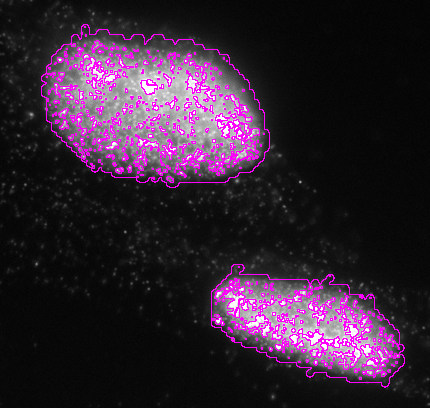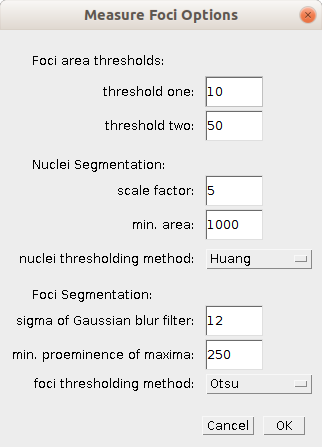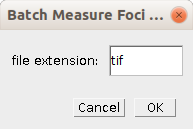-
Notifications
You must be signed in to change notification settings - Fork 16
Foci Per Nucleus Tool
The tool detects, counts and measures the foci per nucleus. It reports the number of small, medium sized and big fosci per nucleus. It also measures the area and mean intensity of the nuclei.


You can find the source code in git-hub here: foci_per_nucleus
To install the tool save the file foci_per_nucleus_tool.ijm under macros/toolsets in your FIJI installation.
Select the foci_per_nucleus_tool toolset from the >> button of the ImageJ launcher.
- The first button on the toolset opens this help page.
- The
m-button runs the foci-analysis on the current image. - The
b-button runs the foci-analysis on all the images in a given folder.
You can find example input images here:
Open the options-dialog by right-clicking on the m-button.
- threshold one and threshold two
- The numbers of foci with an area below threshold one, between threshold one and threshold two and above threshold two will be reported.
- scale factor
- The nuclei are detected on a down-scaled image, this is the factor by which the image is reduced in size for the nuclei segmentation. If over--segmentation occurs, try a higher factor.
- min. area
- Objects detected during the nuclei segmentation, which have a smaller area than min. area will be eliminated from the analysis.
- nuclei thresholding method
- The auto-treshold method used for the segmentation of the nuclei.
- sigma of Gaussian blur filter
- During the segmentation of the foci a blurred version of the image is subtracted from the original image to eliminate the nuclei and the background. This parameter is the sigma of the Gaussian blur filter used.
- min. prominence of maxima
- A seeded watershed is used to separate touching foci. Local maxima in the image are used as seeds. The parameter gives the min. prominence of a maximum from the background to be used as a seed.
- foci thresholding method
- The auto-threshold method used for the segmentation of the foci.
Open the options-dialog by right-clicking on the b-button.
- file extension
- The file-extension of the image-files that will be processed in the batch-processing.
The image is scaled-down by a given factor using bilinear interpolation. A threshold determined by the given auto-thresholding method is applied. The image is converted to a binary mask and the holes of the objects are filled before the binary watershed is applied. The image is scaled back to its original size and the particle analyzer is used to detect the nuclei and to filter out nuclei with a too small area. Nuclei touching the edges of the image are also eliminated.
A blurred version of the image is subtracted from the original image to eliminate most of the nuclei and the background resulting in the image C. The auto-thresholding method is used and a binary mask M is created. On the image C the maxima are detected and used as seeds for a seeded watershed resulting in the image D containing the watershed dams. To separate foci touching each other the AND-operation is applied to the mask M and the dam-image D resulting in the image I. The particle analyzer is used on the image I, individually for each nucleus in the image to detect the foci.
It now works with multi-channel images.
It is now possible to detect the nuclei in one channel and the foci in another.




 Volker Bäcker
Volker Bäcker